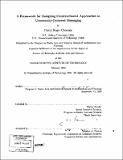A framework for designing constructionist approaches to community-centered messaging
Author(s)
Chesnais, Pascal Roger
DownloadFull printable version (25.42Mb)
Other Contributors
Massachusetts Institute of Technology. Dept. of Architecture. Program In Media Arts and Sciences
Advisor
Walter Bender.
Terms of use
Metadata
Show full item recordAbstract
Social constructionism is a term used to describe systems where individuals take an active role in development that can enhance their community's social setting. This thesis asks, "What is the role of communication technologies in a social constructionalist approach to community-centered messaging?" Towards answering this question, a framework is described for developing and assessing such a system. This framework accounts for the varying skills of the community members, the amount of support the network provider is willing to invest, and the effort needed to use tools. A well designed system can meet the ambitions of the community that employs them, while a poor design leads to frustration and apathy. An experimental platform, Canard, has been built in order to explore this framework. It provides a unified communication representation and tools that allow rapid development of community-centered communication applications that do not require significant expertise to use them. The Canard system has been used by diverse communities over the past two years with varying degrees of success. The degree of success is a function of the group's ambition and willingness to participate in the process of crafting communication solutions for personal and community benefit.
Description
Thesis (Ph.D.)--Massachusetts Institute of Technology, School of Architecture and Planning, Program in Media Arts and Sciences, 2000. Includes bibliographical references (leaves 137-143).
Date issued
2000Department
Program in Media Arts and Sciences (Massachusetts Institute of Technology)Publisher
Massachusetts Institute of Technology
Keywords
Architecture. Program In Media Arts and Sciences